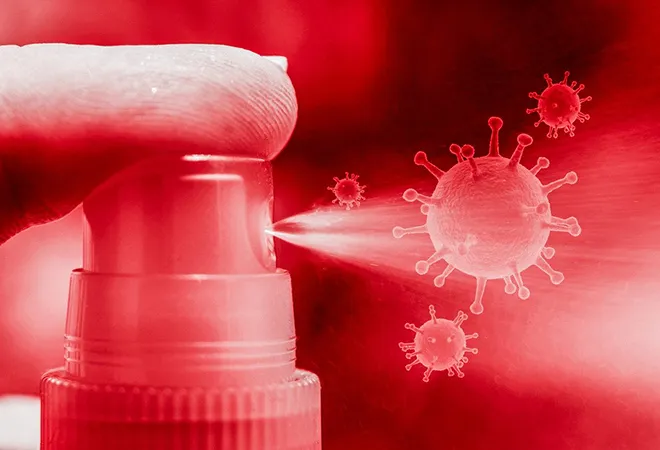
This article is part of the series—Raisina Edit 2022.
The COVID-19 pandemic has reminded us that hygiene, sanitation and water are essential parts of the protective ring of health. At the same time, it has also highlighted that these are areas where there has been a noticeable global shortfall. According to an estimate by the Geneva-based Sanitation and Hygiene Fund, 3.6 billion people still do not have access to safe sanitation and one in three persons do not have basic hand washing facilities. Out of the 300 million women and girls who menstruate on any given day, many do not have the means to deal safely with their menstrual health and hygiene. Water, sanitation and hygiene (WASH), the understated cousin of health, has now climbed to the centre table, thanks to an upstart virus.
Out of the 300 million women and girls who menstruate on any given day, many do not have the means to deal safely with their menstrual health and hygiene.
WASH initiatives emanate when the State lends its conscience to the starkest deficits in human living, be it a toilet, a functional tap, a sanitary pad, or hand wash facilities for school children. Financing is the first of the five accelerators identified by the United Nations (UN) for the timely realisation of the Sustainable Development Goals (SDGs), which includes the "availability and sustainable management of water and sanitation for all by 2030’ (SDG 6). In recent years, India has mounted two gigantic missions to deal with the stress in the WASH situation, Swachh Bharat Mission (SBM) and Jal Jeevan Mission (JJM), and that can potentially serve as a template for the rest of the world.
A Behaviour Change Model
Conceived and commanded by Prime Minister Narendra Modi in 2014, the SBM had a glowing culmination in October 2019, when all states and union territories declared themselves open defecation free (ODF). In 2021, the budgetary allocation to SBM was increased to INR 1.5 lakh crore, a scale of funding never before seen in India or another country that required attending to sanitation. Public funding, political leadership, strategic partnerships, and people’s participation have been key to the mission’s success. Indeed, in 2018, the World Health Organization assessed that three lakh diarrhoea-related deaths will have been averted by SBM’s success over the 2014-19 period. Another study by the UN Children’s Fund concluded that given a household in an ODF village saved INR 50,000 a year due to the time saved and reduced medical costs. Another UN report highlights the economic benefits of SBM in terms of the creation of an equivalent of 7.5 million full time jobs.
The new phase of SBM is engaged in the more complex agenda of solid and liquid waste management with a focus to make all cities garbage free. INR 1,41,678 crore will be spent to manage fecal sludge, plastic reduction, wastewater treatment, and source segregation of garbage in urban areas. The highlight is the adoption of a circular economy—converting waste to resources. In February 2022, a large bio-CNG plant based on municipal solid waste was launched in Indore, which is routinely adjudged as India’s cleanest city.
Another study by the UN Children’s Fund concluded that given a household in an ODF village saved INR 50,000 a year due to the time saved and reduced medical costs.
SBM has proved to be a behaviour change programme, with over 600 million people moving from open defecation to using safe toilets. Access was incentivised by the State, but usage was achieved through the creation and promotion of new habits. A Dalberg study suggests that the mission’s information, education, and communication spend was equivalent of INR 22,000-26,000 crore from various agencies and partners. Swachh Bharat became the natural reference when India’s 1.4 billion people faced another behaviour challenge—masking, social distancing, and hand washing.
As the world struggled with the dilemma of reopening the schools to prevent further learning losses, it was assessed that clean water, hand washing stations, and safe toilets were needed to keep the children safe. A UN report cautioned that nearly 820 million children worldwide do not have basic hand-washing facilities at school, putting them at higher risk of COVID-19 and other transmittable diseases. For India’s 1.6 million schools, what came handy were the swachh vidyalaya (clean school) assets—functional and separate toilets for boys and girls. Adding a set of COVID-19 hygiene measures, a secure campus was made ready to receive 250 million children back in schools.
Water for All
Over two billion people globally do not have access to safe drinking water. According to the NITI Aayog, India too is facing “a very significant water crisis with economic growth, livelihoods, human well-being, as well as ecological sustainability at stake”; nearly 600 million people are facing high to extreme water stress.
India has responded by investing INR 3.6 lakh crore to provide household tap connections by 2024 to a staggering 950 million people across 190 million rural families. JJM, commenced in August 2019, has brought tap water to 60 million new households; the number is poised to touch 100 million by March 2023. An additional INR 2.87 crore is being spent to provide tap connections in 29 million urban households. There is an increasing realisation of the relevance of safe water for women and girls in the house for health and disease prevention and for sustainable socioeconomic development along with preserving the environment and climate.
Public funding and collateral investments in WASH remained a focus, and countries and agencies reaffirmed their commitment to safe sanitation for all through the Delhi Declaration.
The new understanding of the criticality of WASH is assuring as the sector was relatively underfunded in India until a few years ago. Besides higher budgetary allocations, as much as 60 percent of the INR 2,36,805 crore specially granted by the Finance Commission to rural local bodies during 2021-2026 is tied exclusively to basic water and sanitation services. Indeed, financial attention to the sector only enhances collective confidence in long-term health and quality of life.
Sharing and Inspiring
The 2018 Mahatma Gandhi International Sanitation Convention was a moment of hope for countries struggling to overcome sanitation issues. It brought together 55 sanitation ministers and 200 representatives from about 70 countries to deliberate on the path to sustainable sanitation. Public funding and collateral investments in WASH remained a focus, and countries and agencies reaffirmed their commitment to safe sanitation for all through the Delhi Declaration. Several countries in Africa and Asia have since taken up the WASH agenda. In November 2018, after declaring a state of emergency in WASH sector, Nigeria launched the ‘Clean Nigeria, Use the Toilet’ campaign to end open defecation by 2025.
The Indian experience will show that bit by bit is not the way out for countries that face a severe WASH situation. Tight timelines and the bold allocation of public funds are key, as is the involvement of the private sector, civil society, and global development partners. But the State must lead to make WASH everyone’s business. If countries execute this task in a campaign mode, the goals of Agenda 2030 will be within reach.
The views expressed above belong to the author(s). ORF research and analyses now available on Telegram! Click here to access our curated content — blogs, longforms and interviews.




 PREV
PREV



